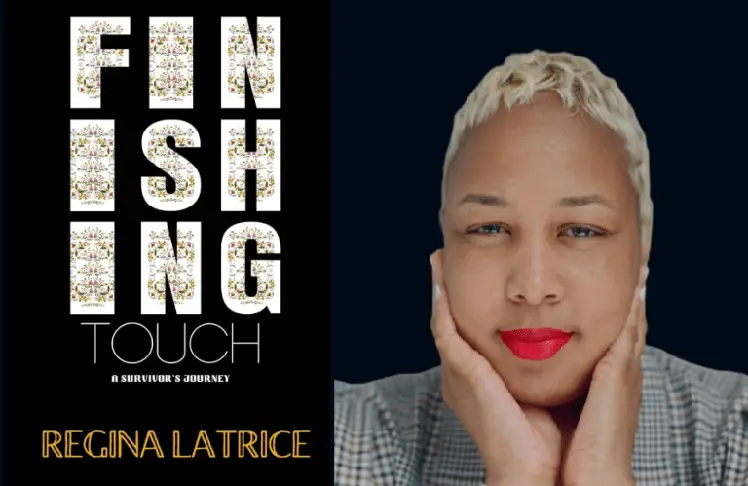
Regina Latrice is many things: a mother, minister, entrepreneur, and a new author. More than anything else, though, she is a survivor.
As a child, she watched her father’s constant verbal and emotional abuse of her mother, when he wasn’t doing the same to her. Latrice’s teenage sister, caught in a drive-by shooting, was left paralyzed and spent weeks in the hospital. Blinded by trauma and low self-esteem, Latrice, then 13, became tied to a physically abusive man, just like her mother did, and often went to school wearing clothes that hid the bruises.
By the time she was 19, Latrice was the mother of three children. She eventually married their father — her abusive boyfriend. But faith in God, belief in herself, and trust in the power of forgiveness helped her not just survive but thrive.
Latrice writes about her journey of self-discovery in her new book “Finishing Touch: A Survivor’s Journey.” It’s an open and honest recounting of a child who became a girlfriend and then a mother before she became a woman. But it also describes how she escaped an abusive relationship by listening to the voice of God, telling her she could set herself free.
“They would say that if God put you together, no one should break you apart,” Latrice told Word In Black in a recent interview. “But they weren’t telling me what to do if God hadn’t put you together. We put ourselves together and wanted God to clean it up. And I didn’t see a way out.”
“But I was always hearing from God.”
Word in Black: When did you realize your family life was not like those of your friends?
Regina Latrice: I guess I always knew. In spite of the abuse, my mom was still able to be with my father, so I can be with someone like that. And then my sister was shot at the age of 17 in a drive-by shooting. So she was paralyzed from the waist down. And that’s when I first got into my relationship, because my mom was a loving mom.
She had seven children. She adopted three, so it was 10 of us. But when my sister got shot, a lot of my mom’s attention had to go to my sister. Hospital visits. Hospital stays. My sister was in the hospital for a long time.
So it opened the door for me to go and look for love in all the wrong places because there’s no one [at home]. My dad wasn’t there. And when he was, he was cursing me out and calling me names.
WIB: How is your relationship with your father? Are you still able to love him?
Latrice: I really love my father, but he’s been so abusive to my mom. He’s an alcoholic and just struggled all his life. Even though they’re married, he was in and out [of the household]. So I never had a father figure. No one esteeming me. No one telling me he loved me, or making me feel beautiful.
I married the exact same thing that my Mom did. That’s the example that I had growing up.
The Bible says to honor your parents. It doesn’t say, ‘…if they’re a good father.’ It doesn’t say, ‘…if he’s a good man. [God] says to honor them. Although I’m hurt, I have to love because if I don’t, God won’t forgive me. I’m gonna be miserable. So I just choose to still love him, but I still protect myself.
During COVID, my father almost passed away. But we couldn’t go see him at the hospital. And I was real bitter and mad at him. I prayed: ‘Lord, please let him come out of this, because if you take him now, I won’t have a chance to make it right. I won’t have a chance to tell him I forgive him before it’s too late.’
So I made a decision after that to really just still be intentional and making sure that I call, check on him, talk to him. It may not be for long. When I go visit, I can’t stay in the house longer than five minutes sometimes because of how he is. But I still want to let him know I still love him because God has commanded me to.
WIB: Tell me about your own family life.
Latrice: By the time I was 19, I had three children and just wanted to give them a life in keeping with my Christian upbringing. I guess I thought [their father] might change once we were married. Instead, he was constantly manipulating me. It got to the point where he’d say, ‘You know, I don’t have anyone.’ It was like trauma binding. We both grew up in the same type of environment..
I couldn’t leave because I didn’t want my kids to grow up in separate homes. It was just a mess. So I used to take on a lot of guilt. And I’m not saying I was perfect because I did some things and said some things. But I’ve dealt with that guilt. I’d always tell myself, ‘I can’t leave him because he doesn’t have anyone. He needs me.’
WIB: What were a few of the warning signs that you were in deep trouble?
Latrice: I had a broken jaw from him before and knew then. He went to jail. I wouldn’t press charges, but the state did. God allowed him to go away for nine months, and that was my way out. But I didn’t listen.
When he got out of jail, he would go to church with me a few times to make me think he’d changed. But he wasn’t consistent. Finally, I had other women telling me about times they’d been in my house while I was at work.
After postponing a court date to file for divorce, a few times, I heard God say, ‘You’re either going to let this marriage die, or you’re going to let your ministry die.” And I knew then I couldn’t play around with it anymore.
WIB: How has your faith sustained you throughout all of this?
Latrice: I actually got married because of my religion. I kept hearing in church that I would die and go to hell for fornicating. But nobody was telling me that I didn’t need to be abused. I had watched my mother being abused and I just thought it was something women had to go through.
WIB: Who are the people who come to you for help?
Latrice: Men and women in heterosexual and homosexual relationships. Abuse happens in all relationships in some form. Sometimes the men are being abused by the women. And either one is abused in same gender relationships.
It’s often domestic abuse, but it’s also women who have been molested; they’re insecure and their self-esteem is shot. They talk about how they feel like they can’t be free. I just talked to two people on Saturday. It was crazy. They say they feel like they don’t know how to get free. They know that they need to, but it’s just about knowing how and knowing that there is help and resources out there to help them.
WIB: Tell me about your business.
Latrice: Misfits Clothing Boutique represents confidence, individuality, and bold self-expression. I created it to empower women to embrace their unique style and stand out unapologetically, no matter what others think. Every piece in Misfits tells a story of strength, freedom, and resilience—reminding women that it’s okay to be different. Misfits isn’t just fashion; it’s a movement that celebrates authenticity and being fearlessly yourself.















